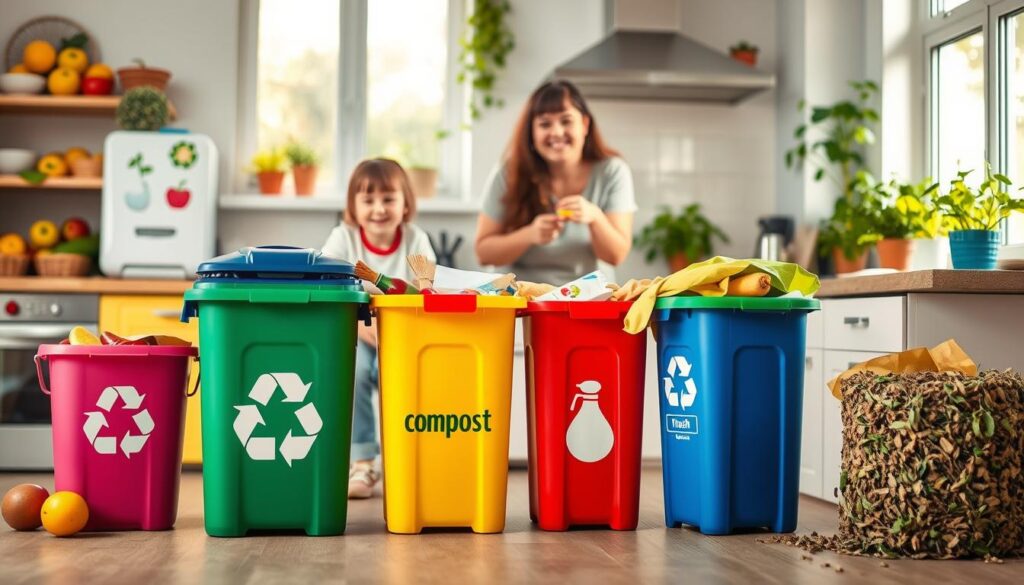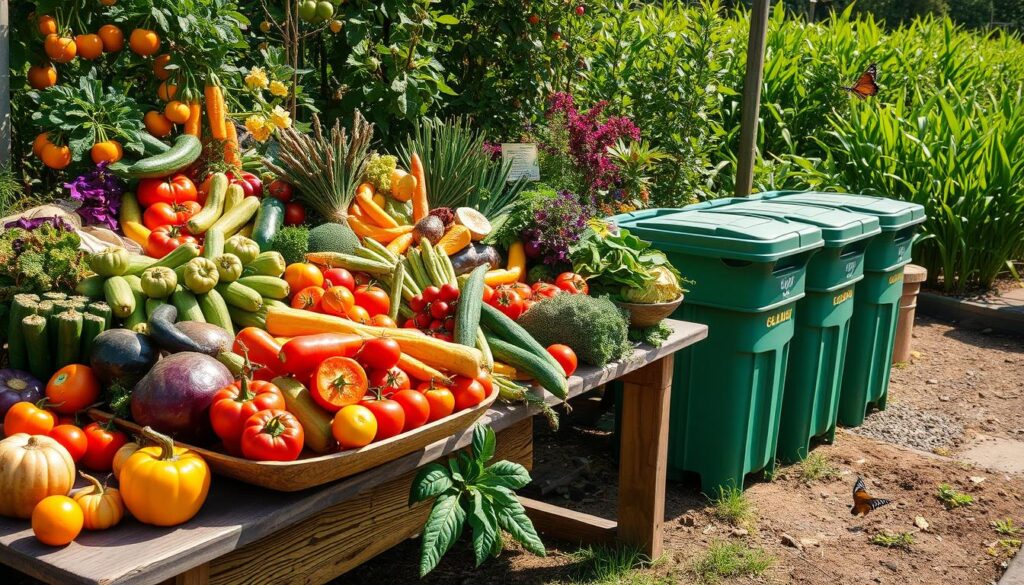Did you know 1.2 trillion gallons of untreated sewage goes into the ocean each year? The world is getting warmer, and pollution is getting worse. This affects over 100 million people worldwide.
But, we can teach our kids to help make the future cleaner. We can teach them about managing waste properly.
Key Takeaways
- Teach children the importance of the 3Rs: Reduce, Reuse, and Recycle.
- Encourage eco-friendly alternatives to disposable plastics to reduce pollution.
- Engage children in upcycling waste into art, fostering creativity and environmental consciousness.
- Promote healthy eating habits to reduce plastic waste from packaged and processed foods.
- Educate children on the significance of proper waste segregation and disposal.
The Importance of Waste Management Education for Children
Teaching kids about waste management is key. It helps them learn about the environment and start good habits early. By learning at home and in school, they understand how their actions affect the planet.
Global Pollution and Its Impact on Future Generations
Today, pollution is a big problem for our planet’s future. Kids, as future leaders, need to know how to solve these issues. Waste management education helps them fight climate change and protect the environment.
- Studies show that educational programs targeting waste management can increase environmentally responsible behaviour among children.
- Incorporating storytelling, games, and hands-on activities can enhance children’s understanding of waste management and environmental conservation.
- Involving families in recycling activities, such as collecting and donating materials, can promote a culture of sustainable practices within households.
| Waste Type | Percentage |
|---|---|
| Food waste | 25% |
| General waste | 35% |
| Glass & plastic waste | 20% |
| Paper & cardboard | 20% |
By crafting toys and art with recycled materials, kids can be creative and learn about waste. Digital tools and platforms for kids help teach about water and saving it.
“Implementing correct disposal management and recycling practices in schools is crucial to promoting sustainability. The importance of education about waste and environmental impact for children is paramount to creating a more environmentally conscious society.”
Through [https://aegissupportservices.com/the-benefits-of-waste-management-in-schools/]waste management education, kids learn to care for the environment. They become change-makers for a greener future.
Implementing Waste Management at Home
Waste management is key to living sustainably, starting at home. By using eco-friendly ways, you can lessen your home’s harm to the planet. You also show others how to live better.
One good practice is separating waste. Sorting waste into recyclable, compostable, and non-recyclable parts makes waste management better.
Making smart food choices is another way to live sustainably. Choose fresh, local food and avoid packaged items to cut down on plastic. Growing your own food in a kitchen garden is great too. It lets you enjoy fresh food and care for the earth.
“As the leaders of tomorrow, children need to be well-equipped to safeguard the planet. By making them more environmentally conscious, we can give them the keys to make the world a better place.”
Getting kids involved in waste management is very effective. Teach them to sort waste, compost, and understand recycling. It teaches them to care for the planet and be responsible.

Starting waste management at home is easy but very important. It helps make a better future. By teaching your family and community about household waste management, recycling, and eco-friendly practices, you can help protect our planet.
Proper waste segregation
Segregating waste is key for a green future. In the UK, big businesses must sort food waste since 2023. This helps stop food waste from going to landfills.
It also means less bad methane gas. Businesses must also sort out harmful waste like batteries and chemicals. This keeps everyone safe and helps the planet.
Local councils must collect recyclables like paper and plastic. This makes everyone’s job easier. It’s good for the planet and can save money too.
Sorting waste right can save energy and cut down pollution. It makes a company look good to people who care about the planet. This can attract more customers.
| Waste Type | Segregation Practices | Benefits |
|---|---|---|
| Food Waste | Separate collection for composting or energy conversion | Reduces methane emissions from landfills |
| Hazardous Waste | Segregate and handle according to regulations | Ensures safe disposal and environmental protection |
| Recyclable Materials | Separate collection for paper, cardboard, plastic, metal, and glass | Promotes recycling and resource conservation |
By sorting waste well, UK businesses help the planet. They support a green economy and show they care about the environment. This is good for the planet and can help their business too.
“Proper waste segregation is the foundation for a sustainable waste management system and a circular economy.”
Sustainable Eating Habits
Eating in a way that’s good for the planet is great for your health too. Eating more fruits, veggies, and plant-based foods helps the earth. It also cuts down on food waste and supports farming that’s kind to the soil and water.
Getting kids to help with a kitchen garden is a fun way to teach them about eating right. They learn to care for plants and see where their food comes from. This helps them understand why we need to take care of the earth.
| Sustainable Eating Practices | Environmental Benefits |
|---|---|
| Choosing plant-based meals | Reduces greenhouse gas emissions and land use associated with animal agriculture |
| Selecting sustainable seafood options | Supports healthy marine ecosystems and fish populations |
| Reducing food waste | Minimises the environmental impact of food production and disposal |
| Buying local and seasonal produce | Decreases the carbon footprint associated with food transportation |
Choosing to eat in a way that’s good for the planet helps everyone. It makes our food healthier and our planet greener. Every little bit we do makes a big difference for our kids’ future.
“The greatest threat to our planet is the belief that someone else will save it.” – Robert Swan

The Role of Engineers in Solid Waste Management
Waste management is very important today. Engineers help find ways to manage waste better. They design landfills and create new ways to use waste energy.
Engineers design landfills carefully now. They don’t just dump waste anymore. They use special materials and systems to keep the land and water safe.
They also look for new ways to deal with waste. Like turning waste into energy. This way, waste doesn’t go to landfills. It helps power homes and businesses.
Engineers do more than just build things. They work with others to plan how to manage waste. They help from start to finish, making sure waste is handled right.
| Waste Management Responsibilities for Engineers | Key Focus Areas |
|---|---|
| Landfill Design and Construction | Ensuring environmental safety, preventing leakage, and managing methane gas |
| Waste-to-Energy Systems | Converting waste into electricity and heat to power communities |
| Comprehensive Waste Management Strategies | Collaborating with urban planners and scientists to address the entire waste lifecycle |
As the world faces more waste, engineers are key. They use new tech and work together to make a better future. They turn waste into something useful.
Fun Activities to Teach Kids About Recycling
Recycling Games and Activities for Kids
Recycling games and activities teach kids about pollution and how to reduce it. They help keep our planet safe and teach us to use resources wisely. Recycling turns old things into new, useful items.
Playing recycling games with your kids teaches them about saving the environment. It also helps them think creatively and work together. Here are some fun games and activities to try:
- Waste no water: Challenge your kids to find ways to reduce water usage at home.
- Trash Ball: Create a game where kids toss recyclable items into designated bins.
- Bottle Bowling: Use empty plastic bottles as pins and a ball made from recycled materials.
- Sorting Recycle Items: Teach your kids to sort recyclable materials into different categories.
- Scavenger Hunt: Hide recyclable items around the house and have your kids search for them.
- Recycling Basketball: Toss crumpled paper or aluminium cans into a recycling bin.
- Tumbling Tows: Use recycled materials to create a mini obstacle course.
- Bottle Cap Tic-Tac-Toe: Play a game using bottle caps as game pieces.
- Recycling Relay: Divide into teams and have a relay race to sort recyclables.
- Can Pong: Set up a game where kids try to toss a ball into cans.
- Newspaper Dump: See who can shred newspaper the fastest.
- Recycling Monster: Create a monster out of recycled materials.
- Recycling Bin Race: Have a race to see who can sort recyclables the fastest.
- Sustainable Sounds: Use recycled materials to make musical instruments.
These games and activities teach kids to solve problems and work together. They also make them more aware of the environment. By making recycling fun, you can teach them to care for our planet.
| Recycling Fact | Impact |
|---|---|
| Recycling 1 ton of paper can save 17 trees, 7,000 gallons of water, 2 barrels of oil, and 4,000 kilowatts of electricity. | The energy saved from recycling 1 ton of paper can power one home for 5 months. |
| Recycling one ton of paper saves 17 trees, 7,000 gallons of water, and 3 cubic yards of landfill space. | Colour-coded bin systems can assist in proper recycling; for example, a blue bin for paper, a green bin for plastic, and a yellow bin for metal. |
| Bin labels help individuals identify which materials are accepted for recycling. | Recycling is crucial for waste management as it conserves natural resources, reduces pollution, and saves energy. |
By doing these recycling activities for kids, you teach them to care for the environment. This helps them learn about eco-friendly education and prepares them for a sustainable future.
Conclusion
Waste management helps both kids and grown-ups. It teaches kids to be careful with the planet. This makes them good leaders for the future.
Playing games about recycling teaches kids important lessons. It helps them learn to solve problems and care for the earth. This way, we help them make the world better.
Good waste management is good for everyone. It makes our community stronger. By teaching kids to care for the earth, we help create a better future.
